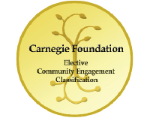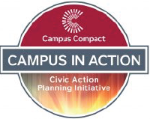


Our Philosophy
We commit to serving as a catalyst for change...
Community engagement describes the collaboration between Universities and their larger communities (local, regional/state, national, global) for the mutually beneficial exchange of knowledge and resources in a context of partnership and reciprocity.
- Carnegie Foundation for the Advancement of Teaching
Community engagement is defined by relationships between those in the university and those outside the university that are grounded in the qualities of reciprocity, mutual respect, shared authority, and co-creation of goals and outcomes. Such relationships are by their very nature trans-disciplinary (knowledge transcending the disciplines and the college or university) and asset-based (where the strengths, skills, and knowledges of those in the community are validated and legitimized).
Definitions
Anchor institutions are enterprises such as universities and hospitals that are rooted in their local communities by mission, invested capital, or relationships to customers, employees, and vendors. As place-based entities that control vast economic, human, intellectual, and institutional resources, anchor institutions have the potential to bring crucial, and measurable, benefits to local children, families, and communities.
-The Democracy Collaborative
Civic engagement means working to make a difference in the civic life (public life of the citizen) of our communities and developing the combination of knowledge, skills, values, and motivation to make that difference. It means promoting the quality of life in a community, through both political and non-political processes.
A morally and civically responsible individual recognizes himself or herself as a member of a larger social fabric and therefore considers social problems to be at least partly his or her own; such an individual is willing to see the moral and civic dimensions of issues, to make and justify informed moral and civic judgments, and to take action when appropriate.
-From Civic Responsibility and Higher Education, edited by Thomas Ehrlich (2000)
Service-learning is a type of experiential education that combines and pursues both achieving academic learning and meeting a relevant community defined need with intentionally integrating the use of effective ongoing reflection and assessment.
-Drake Experiential Learning Council, 2011
Global Service Learning (GSL) is the intersection of service-learning, immersion in global contexts, and intercultural education. GSL is a form of experiential education that combines academic learning and meeting a relevant community-defined need. Quality service-learning is undertaken intentionally and integrates effective cross-cultural interaction, ongoing reflection, and assessment.

